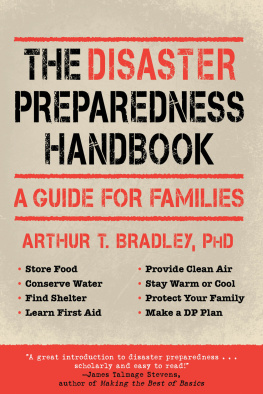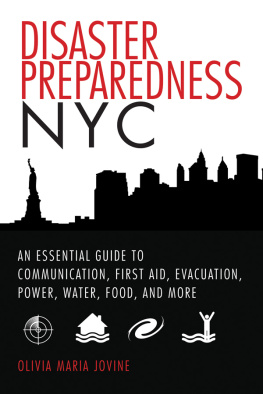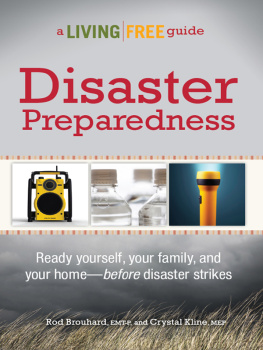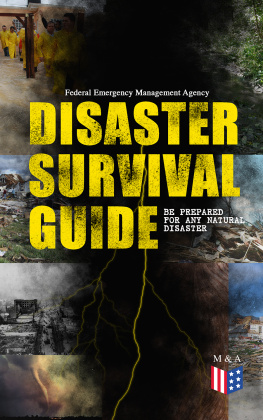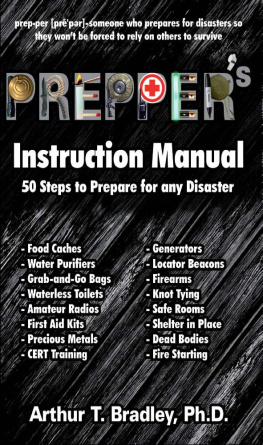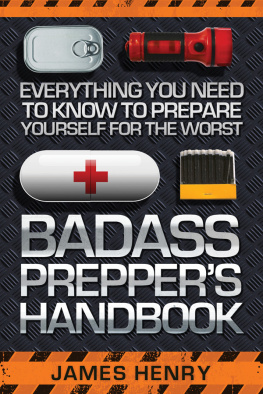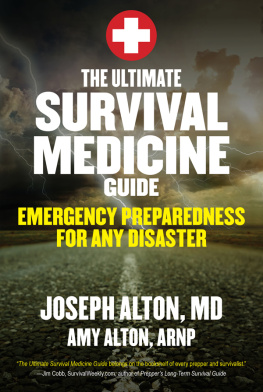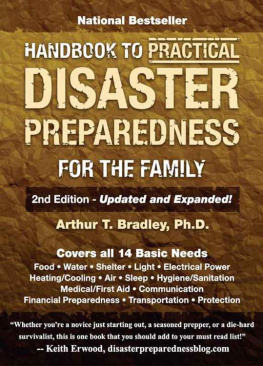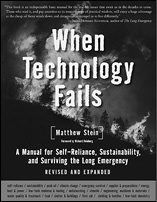The Disaster Preparedness
Handbook

Arthur T. Bradley, PhD
Foreword by
Curtis A. Bradley

Except for the worksheets in the Appendix, no other part of this book may be reproduced or transmitted in any form or by any means without prior written permission from the author.
Photos and illustrations used throughout the book are public domain or licensed under the Creative Commons Attributions-Share Alike or GNU Free Documentation License, except where credits are otherwise noted.
Special thanks are extended to Siobhan Gallagher and Bridget Flanagan for editing the book's content, Marites Bautista for designing the layout, and Bryan Macabanti for illustrations.
Copyright 2010, 2011 by Arthur T. Bradley
All Rights Reserved. No part of this book may be reproduced in any manner without the express written consent of the publisher, except in the case of brief excerpts in critical reviews or articles. All inquiries should be addressed to Skyhorse Publishing, 307 West 36th Street, 11th Floor, New York, NY 10018.
Skyhorse Publishing books may be purchased in bulk at special discounts for sales promotion, corporate gifts, fund-raising, or educational purposes. Special editions can also be created to specifications. For details, contact the Special Sales Department, Skyhorse Publishing, 307 West 36th Street, 11th Floor, New York, NY 10018 or info@skyhorsepublishing.com.
Skyhorse and Skyhorse Publishing are registered trademarks of Skyhorse Publishing, Inc., a Delaware corporation.
www.skyhorsepublishing.com
10 9 8 7 6 5 4 3 2 1
Library of Congress Cataloging-in-Publication Data is available on file.
ISBN: 978-1-61608-387-8
Printed in China
Disclaimer: This book is intended to offer general guidance relating to disaster preparedness. It is sold with the understanding that every effort was made to provide the most current and accurate information. However, errors and omissions are still possible. Any use or misuse of the information contained herein are solely the responsibility of the user, and the author and publisher make no warrantees or claims as to the truth or validity of the information. The author and publisher shall have neither liability nor responsibility to any person or entity with respect to any loss or damage caused, or alleged to have been caused, directly or indirectly, by the information contained in this book. Furthermore, this book is not intended to give professional dietary, financial, or medical advice.

This book is dedicated to family?,
both yours and mine.
May they all be kept safe no matter how
dark the skies.

CONTENTS
FOREWRD
The world of late has been in upheaval: earthquakes, tsunamis, hurricanes, terrorist strikes, pandemics the deadly list grows with each passing day. It is as if we are being given a warning to ready ourselves for things to come. Whether that warning is from God or simply a result of our own empirical observations is up to every individual to decide. What is undeniable is that the world is openly demonstrating its ferocity.
Every generation faces its own unique challenges. Our grandparents and great grandparents weathered world wars, food shortages, deadly pandemics, and nearly total financial ruin. They did so with grit and determination and by coming together as communitiessharing in their collective need to survive. This connectedness has all but disappeared, save for the most rural areas of our country. The sad truth is that, today, many people don't even know their neighbors names.
Recently, however, there has been an awakening in our country. People are realizing that there truly is strength in numbers. Churches, fraternal organizations, veterans groups, friends, and neighbors are discussing more and more how best to prepare for uncertain challenges. Food storage, water purification, backup electrical power, and community protection are all being considered.
Having learned much from my many roles in life, including marine, police officer, father, and priest, I can attest to the three things necessary for survival: knowledge, preparation, and determination. This book you hold in your hands represents the first of those three steps. The author has done his part to lay out commonsense approaches to meet your family's needs during nearly any crisis. The rest is up to you.
Now let's get to the Introduction. Time may be short!
Curtis A. Bradley
Shichidan, 7th Degree Black Belt
Tracy's Kenpo Karate
INTRODUCTION
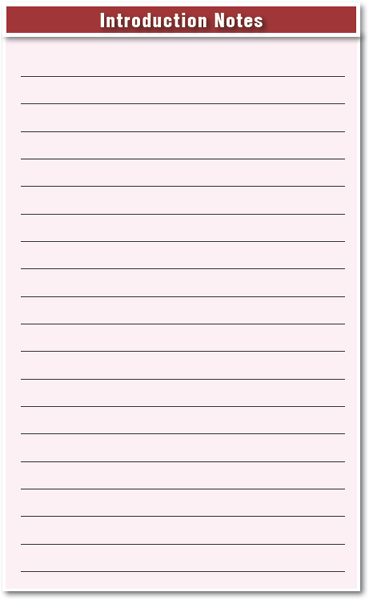
INTRODUCTION
R ight out of the gate let me tell you what this book is NOT. It is not a book about fighting off hordes of flesh-eating zombies, should they ever rise from the grave. Nor will it describe how to survive a shipwreck by feasting on coconuts and roasted iguana. Finally, it is not intended to help you survive our planet being sucked into the cosmic fireball affectionately known as our Sun. If you wish to prepare for those types of events, I respectfully suggest that you continue your search for a more suitable text.
This book is designed to help your family prepare for more commonplace, yet still potentially deadly, disasters. The list is long and varied and includes hurricanes, tornados, terrorist attacks, earthquakes, pandemics, financial collapse, widespread blackouts, and much more. My hope is that this handbook will accomplish three things: (1) motivate you to become better prepared, (2) illustrate how to prepare effectively, and (3) help you to realize your place in a larger movement.

If you are going to become a true prepper, you should start by learning the disaster preparer's mantra. Let's all say it togetherready, here goes
The sky is falling! The sky is falling!
It helps if you wave your hands wildly above your head for effect. Seriously, give it a try. It is best to get this silliness out of your system now; that way you won't succumb to it later. Besides, you might as well say it a few times because you are almost certainly going to be accused of thinking iteven if only by way of stage whispers and snooty grins.

Why bother? You better know the answer in your heart of hearts.
At the root of this incredulity lies a very basic question: Why? Why bother to prepare at all? Behind this question is the unspoken assertion that preparing for a disaster is unnecessary. It can be argued that most of us live in a fairly safe and stable world. What are the chances that you will ever need large stores of food or water? When will you actually use the carefully stocked first-aid kit that you keep in the car's trunk? Wouldn't your time, money, and energy be better served by focusing on life's knowns rather than its unknowns?

